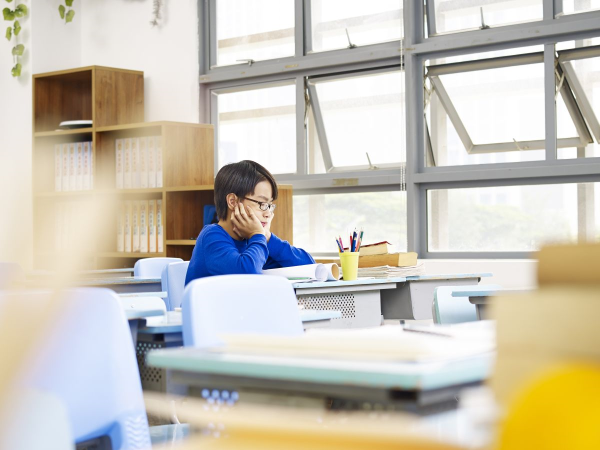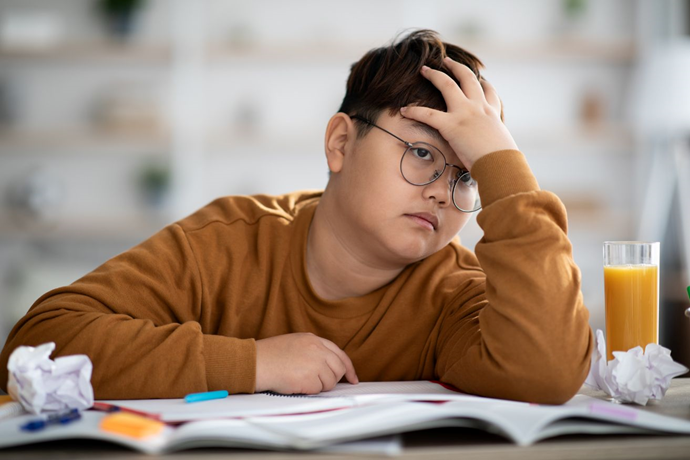Parenting Hacks (4): Importance of Home-School Collaboration to Twice-exceptional Students | Understanding Giftedness | HKAGE
Cultivating gifted students is already a significant challenge, but nurturing twice-exceptional students brings in a greater challenge, which may be several times more difficult than the former situation. Therefore, parents and teachers of twice-exceptional students need to exert even more effort to educate these children, who possess both talents and special educational needs, helping them overcome the difficulties created by their special educational needs, and unleash their potential.
Parents and teachers are the primary stakeholders of twice-exceptional students and key individuals in their development, and thus the close collaboration of these two parties will contribute to meeting the developmental needs of these students.
Parents in the Advocacy Role for Twice-exceptional Gifted Students
In addition to providing support in learning, talent development, and social-emotional aspects for twice-exceptional students, parents also play another crucial role as advocates for these students. However, raising public awareness of twice-exceptional students is challenging. One reason is that some educators still do not understand the unique needs of twice-exceptional students, and these teachers view them as gifted students capable of completing assignments but may misunderstand them as being lazy, unmotivated, or even rebellious (Trail, 2011).

Further Reading: Parenting Hacks (1): Understanding Twice-exceptional Students
Further Reading: Parenting Hacks (2): How to Nurture the Potential of Twice-exceptional Students?
As advocates for twice-exceptional students, parents must gather objective data to clearly demonstrate the impact of learning problems, social and emotional issues on academic performance. Parents need to remember to avoid blaming their child, regardless of whether their child's performance meets their expectations. During the communication process, parents should express their concerns as clearly as possible. In doing so, parents are demonstrating to their children how to advocate for their rights throughout the problem-solving process.
Dr Baum and Dr Owen (2004) differentiate the advocacy roles of parents in different stages of a child's development:
Elementary School Stage
At this stage, parents maybe sometime the first to recognise their child's twice-exceptional traits. Parents must establish a good relationship with teachers and other school staff and share effective strategies used at home, explaining how their child performs well at home. This can provide teachers with insights into developing strategies for addressing the needs of twice-exceptional students in the classroom. If initial attempts to improve the current situation are unhelpful, parents may need to seek a comprehensive assessment to better understand their child’s situation. Meanwhile, parents must explore their rights and available community resources for children who are suspected to be twice-exceptional.

When providing support to their children at home, parents should take note of their preferred learning style. Time management skills and task breakdown techniques can help children tackle tasks in manageable parts. Sometimes, when academic pressure becomes overwhelming, parents may need to reserve a day for leisure or mental health to allow their child to temporarily relax. Additionally, parents should express their interest in their child's talents and abilities to strengthen their self-identity and social competence. At the same time, parents should lead by example and establish a caring and socially responsible role model. During summer vacation, engaging in likeable extracurricular activities may contribute more to a child's development than attending tutoring or cram schools.

Junior Secondary School Years
During the middle school years, many different types of challenges (even ones that were already resolved in elementary school) may resurface. The middle school curriculum demands more reading and writing skills, as well as more complex executive functioning skills. At the same time, students are striving to find a peer group that accepts them, and some twice-exceptional students may even hide their disabilities to fit in. Parents may find their children struggling between relying on them and seeking greater autonomy. Some children who want to excel academically may sacrifice their social lives or extracurricular activities, while others who cannot meet academic expectations may choose to give up trying continuously in their studies.

During this stage, parents of twice-exceptional students have a more complex role. At the beginning of each school year, parents should proactively hold collaborative meetings with relevant school personnel to discuss the adaptive methods and strategies available for their children.
Parents must empower their children to advocate for themselves and assist them in advocating for themselves more in school. Dr Trail offers some strategic suggestions (2011):
- Help children understand their strengths, weaknesses, and learning styles, so they can develop effective strategies for success in school. Involve children in the problem-solving process and give them opportunities to communicate their needs to others in order to succeed in school.
- Foster the necessary communication skills for children to assert themselves, such as role-playing how to approach teachers for meetings and how to conduct meetings.
- Teach children how to collaborate in groups, listen to other students’ opinions, and make compromises when necessary.
- Help them understand how to face setbacks, demonstrate self-control, and manage their behaviour.
At home, parents should be their children’s “homework partners” rather than “homework police.” Hiring a tutor can help parents focus on their children’s strengths. Differentiating between tasks children should be able to complete on their own and areas where they may need assistance can help strengthen their sense of self-efficacy and provide them with successful experiences. Parents can also continue to nurture the talents of twice-exceptional students through broader community activities such as literary events, scientific research, uniformed groups like scouts, and sports activities like karate, allowing children to engage in activities with peers who share similar interests and talents.

Senior Secondary School Years
During the high school years, many twice-exceptional adolescents face new challenges. The curriculum becomes more demanding, academic pressure increases, and there are long essays that require comprehensive skills and organisational abilities, all of which add to the pressure faced by twice-exceptional high school students, leading many of them to experience high levels of stress. Important exams, confusion about future education and career paths, and the development of social relationships make school life extremely tense.
Parents and twice-exceptional adolescents must continue to engage in appropriate activities and services, including counselling services designed for adolescents. Internships, independent research, and online courses can stimulate twice-exceptional adolescents. Even if this leads to failure, it is important to hold adolescents accountable for their actions. This kind of self-discipline attitude will be crucial for their continued education. Parents should remember to establish a positive and healthy relationship with these adolescents. Clearly expressing interest in their children's talents and aspirations can provide parents with many opportunities to communicate with their children. If adolescents show signs of depression or confusion, they may need to seek counselling support.
It is important to find counsellors who have knowledge of twice-exceptionality, as they can understand the strengths and weaknesses of twice-exceptional adolescents. Some group counselling activities can provide them with time for reflection and discussions on topics such as twice-exceptional identity, how to express their needs to others around them, and studying the biographies of successful twice-exceptional individuals throughout history. Collaborating with counsellors and helping twice-exceptional adolescents plan for the future and set career goals that align with their strengths and interests is also an important step.

Further Reading: Parenting Hacks (3): Cultivating Executive Functions in Twice-exceptional Students
Further Reading: Parenting Hacks (5): Twice-exceptional Students Can Succeed - Gifted Children with Autism
Home-School Collaboration
Research shows that collaboration between families and schools has a positive impact on children's attendance, homework completion, and academic performance (Henderson, Johnson, Mapp & Davies, 2006). However, for many twice-exceptional students, the school experience can be frustrating. Often, their weaknesses are evident within the school system, while their strengths are showcased in activities outside of school. This makes it difficult for teachers to identify their gifted potential, and parents may feel ignored or undervalued, leading to growing frustration.
Dr Trail (2011) offers some suggestions for improving home-school collaboration:
Role of the School:
- Welcome parental involvement in school activities and understand their expertise, allowing them to participate in school volunteer services. Appreciate their contributions, which enhance educational opportunities for the children.
- Strive to establish and maintain a relationship of mutual respect with parents through open communication and shared decision-making.
- When twice-exceptional children experience failure at school, the school should understand the parents’ feelings of frustration and assess their needs. It’s important to recognise that some parents may also be twice-exceptional and have had negative experiences in school themselves.
Role of Parents:
- Advocate for their gifted children's rights but avoid solving all problems for them or demanding special treatment from the school.
- Encourage their children to handle their difficulties independently and teach them self-advocacy skills.
- Collaborate with educators on problem-solving processes and implement suggested interventions and strategies at home.
- Seek community organisations and resources to expand their children's out-of-school educational opportunities and provide opportunities for them to learn and work with other children who share similar interests and talents.
Further Reading: Nurturing Gifted Students: How do Parents Get Along with Their Gifted Children?
Related information: Parent Education Programme/Workshop/Other Support






